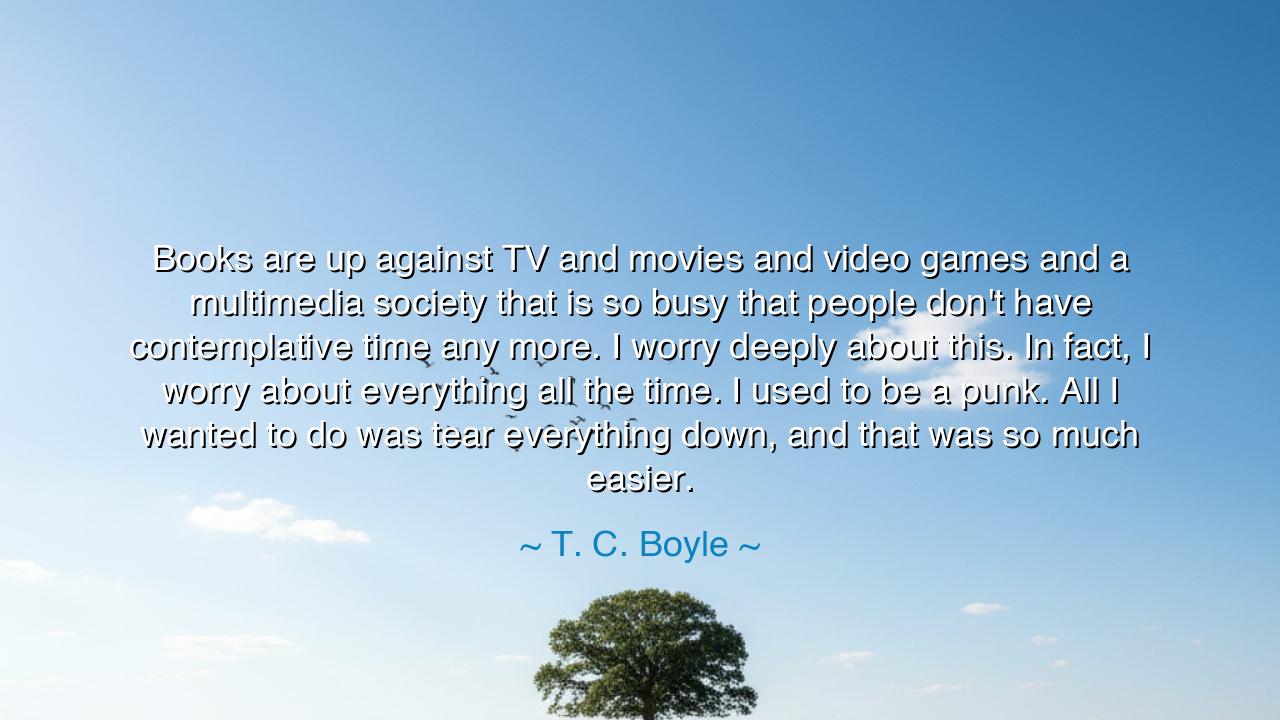
Books are up against TV and movies and video games and a
Books are up against TV and movies and video games and a multimedia society that is so busy that people don't have contemplative time any more. I worry deeply about this. In fact, I worry about everything all the time. I used to be a punk. All I wanted to do was tear everything down, and that was so much easier.






T. C. Boyle’s words, "Books are up against TV and movies and video games and a multimedia society that is so busy that people don't have contemplative time anymore. I worry deeply about this. In fact, I worry about everything all the time. I used to be a punk. All I wanted to do was tear everything down, and that was so much easier," offer a reflection on the rapid, sometimes overwhelming, pace of modern life and the decline of quiet reflection in an era dominated by instant gratification and constant distraction. Boyle’s lament speaks to the tension between the deep, introspective value of books and the competing stimuli of television, movies, video games, and the multi-layered nature of the digital age. His worry is not just about the decline of reading, but about the loss of the time and space necessary for contemplation—that quiet, reflective space where true thought and wisdom can flourish.
In the ancient world, storytelling was a communal activity—people gathered around campfires, in public squares, and in theaters to listen to epic poems and plays that encouraged reflection on the human condition. The Greek philosophers, like Socrates, believed deeply in the value of dialogue and questioning as a way of cultivating knowledge and wisdom. Socrates often would wander the streets, engaging in discussions that would last for hours, urging his students to ponder the complexities of morality, knowledge, and truth. Plato, in his writings, captured the essence of these dialogues, believing that contemplation was the path to a deeper understanding of the world. In these moments of deep reflection, the mind could expand, and new insights could be birthed. This time for contemplation was valued as sacred, a space where true learning could unfold.
But just as the ancient world had its own distractions, we see in Boyle’s words the modern equivalent. The rise of multimedia—television, movies, video games, and the internet—has created a world where the pace of life moves faster than ever before. Consider the story of the fall of Rome, a civilization that once prided itself on its philosophers, architects, and thinkers. As the empire expanded, so did its distractions. The gladiatorial games and other forms of entertainment, designed to distract the populace from the hardships of daily life, grew in popularity. The people of Rome, once thinkers and builders of great empires, became captivated by the easy pleasures of spectacle. What was lost in this transition was the space for contemplation, the sacred time for reflection that had once been the heart of their philosophical teachings. This moment in history echoes Boyle’s concern—that as we fill our lives with distractions, we risk losing our ability to think deeply and reflect meaningfully.
Boyle’s statement also carries the weight of his own personal journey—from the punk who wanted to tear everything down to the individual who now sees the importance of preserving the quiet, contemplative time that allows for growth and wisdom. Much like the young rebel who seeks to disrupt the status quo, many in the past have rebelled against the structures that seemed to stifle personal thought and individuality. The Romantics, for instance, challenged the rationality of the Enlightenment, celebrating instead emotion, nature, and the individual spirit. But as Boyle reflects on his past, he realizes that the revolutionary act is not always about destruction—sometimes, it is about preserving the things that matter most, like the quiet space for reflection, the time to read, and the ability to think deeply without the constant hum of technology and media around us.
In the same way that Socrates used questions to engage his students in deep thought, Boyle’s critique serves as a question to us all: Are we losing our ability to think deeply? The constant noise of the modern world, from social media to television shows to endless streams of content, threatens to drown out the quieter moments of reflection. Just as the ancient sages recognized the importance of silence and contemplation for the growth of wisdom, Boyle’s words remind us that we must guard this sacred time. Without it, we risk becoming overwhelmed by the chaos of our surroundings, unable to form our own thoughts or connect with our deeper sense of meaning.
The lesson from Boyle’s words is one of balance—to not let the distractions of the world consume us entirely. Like the philosophers of old, who valued the silence of the mind, we must learn to carve out time for contemplation, for reading, and for reflective thought. There is wisdom in embracing the quiet moments, in stepping away from the noise, and allowing our minds to recenter. Just as the ancient bards passed down wisdom through their stories, we too must seek out those moments where we can reflect on the world and our place within it, without distraction.
As you move through life, ask yourself: How often do you take the time to simply be still, to reflect on what truly matters, without the constant pull of technology and media? Make space for contemplation, whether through reading, meditation, or simply spending time in nature. Prioritize quiet reflection, for it is in these moments that true growth, understanding, and insight are nurtured. Just as the ancient philosophers understood that thought and reflection were keys to wisdom, so too can we find our path through the noise of modern life by carving out the time to think deeply and meaningfully.






AAdministratorAdministrator
Welcome, honored guests. Please leave a comment, we will respond soon